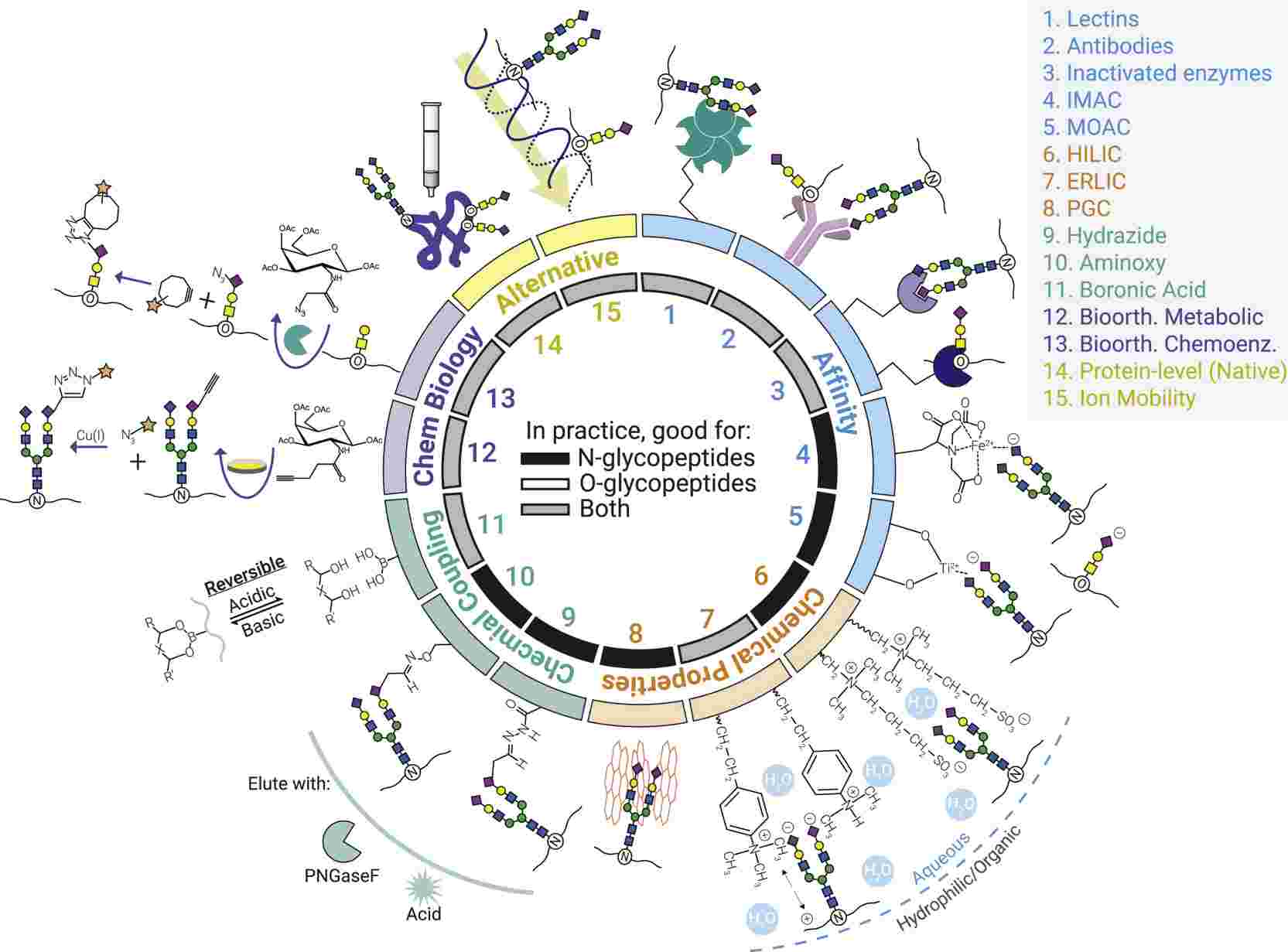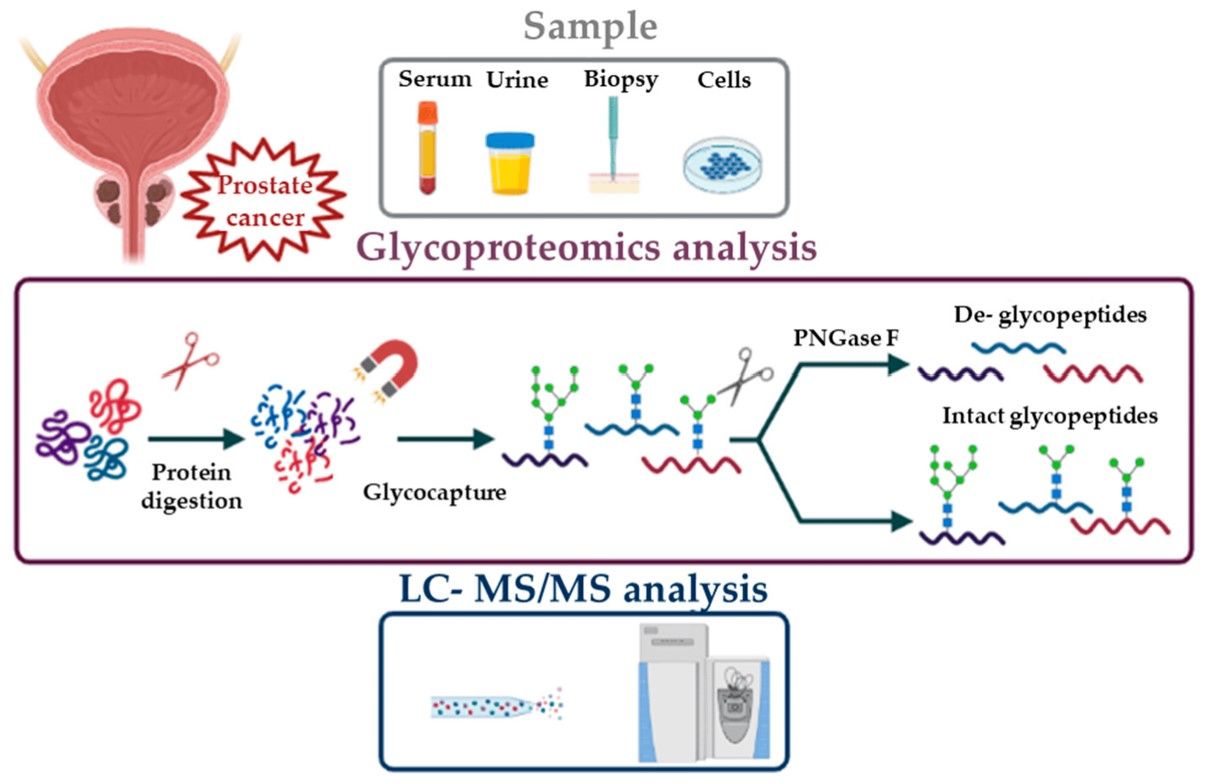Glycoprotein analysis is a big challenge because of the complexity of carbohydrate structures and their derivatives. With years of experience and first-in-class technologies, Creative Biolabs has successfully developed versatile glycoprotein analysis platforms to provide a series of glycoprotein analysis services. We are glad to offer the largest and most diverse portfolio of glycoprotein products or services based on the values of quality, timing, and price. We will be the best partner in your glycoprotein project to help you get milestone success.
Glycoprotein Analysis Is Necessary for Therapeutics Development
Glycoproteins have increasing applications in therapeutics, such as plasminogen activator for the treatment of myocardial infarction and strokes, erythropoietin for anemia and various monoclonal antibody-based treatments for cancer. Protein N- and O-glycosylation is perhaps the most crucial and immensely complex posttranslational modification that proteins undergo, and its characterization remains to be a great challenge. Glycosylation site analysis, corresponding glycoprotein type analysis and glycoprotein quantification have become a regular study in glycosylation engineering. Glycoprotein analysis is beneficial for the assignment of distinct functional properties to defined structural features, especially on the respective carbohydrate moieties.
Glycosylation analysis plays a vital role in disease research, providing insights into the complex sugar structures on proteins and lipids, which are often altered in various disease states. Creative Biolabs provides powerful Glycosylation Analysis Services for Disease Research, covering a variety of malignancies, including:
By analyzing glycosylation patterns, researchers have the potential to identify new biomarkers for early detection, monitoring disease progression, and even predicting treatment response. In addition to oncology, glycosylation analysis is also helping to understand and address other major health challenges. This includes research into Lung Diseases, where abnormal glycosylation can be associated with inflammation and tissue damage, and Liver Diseases, where altered sugar structures are often observed in diseases such as cirrhosis and fibrosis. In addition, these analysis services are helping to study Inflammatory Bowel Disease (IBD) and Meningioma, revealing the immune dysregulation characteristic of such diseases. Indeed, these comprehensive glycosylation profiling services provide researchers with an important platform to delve into the fundamental molecular changes associated with these diseases, ultimately paving the way for a deeper understanding of disease mechanisms.
 Fig.1 Glycosylation enrichment strategies.1, 3
Fig.1 Glycosylation enrichment strategies.1, 3
To support researchers in glycoprotein engineering, we provide a series of technologies for glycoprotein analysis, including but not limited to lectin microarray, mass spectrometry (MS), liquid chromatography (LC) technology, high-performance liquid chromatography (HPLC), to analyze glycoprotein structure, perform glycoprotein detection and test glycoprotein quantification. Based on our powerful technology platform, Creative Biolabs offers comprehensive glycosylation analysis for various Virus Glycoproteins.
-
Glycoprotein Detection
Effective enrichment and highly sensitive detection of glycoproteins from serum can significantly reduce sample complexity in proteomics studies. The biological importance of glycoproteins has only partially translated into multiple detection reagents and kits. There are some basic options commonly used in glycoprotein detection, such as glycan-specific gel stains, enzyme/antibody-based affinity western blotting, etc.
-
Glycoprotein Structure Analysis
A protein may contain multiple glycan forms in several locations, which can be assembled from a variety of monomer subunits and form complex branching structures because of their multiple linking positions. So, it is important to obtain a detailed glycan compositional and structural profile from purified glycoproteins or protein mixtures, which usually determine their structure and functions. We can provide the most diverse portfolio of glycoprotein structure analysis service, mainly including glycan profiling, glycomic profiling, glycosylation site mapping, and glycan sequencing.
-
Glycoprotein Quantification
Quantitative proteome profiling of protein-borne oligosaccharides has become increasingly important both in the basic researches of biochemistry and glycobiology and in the applicative sciences, particularly biomedicine and biotechnology. But the substoichiometric relation between glycosylation and the protein constitutes a further challenge in glycoprotein quantification. Now, several efficient methods have been developed for glycoprotein quantification, such as lectin associated chemical or biological assays, which are the simplest methods.
Moreover, glycosylation can affect protein stability, activity, and immunogenicity, so glycosylation analysis provides insights into the structure, functions, and metabolic pathways of glycoproteins, thereby providing important information for basic scientific research, clinical diagnosis, drug development, and other fields. Creative Biolabs has a mature glycoprotein analysis platform, and we provide glycosylation analysis for a variety of biological sample types, including but not limited to the following.
We use a variety of mass spectrometry techniques to comprehensively analyze the glycoforms of antibodies. Clients can provide monoclonal antibodies, polyclonal antibodies, or other types of antibody preparations as analysis samples.
-
Glycoproteins in serum, plasma, or whole blood can provide important glycosylation information, which is of great significance for disease diagnosis and monitoring.
-
Serum is an easy-to-sample biological sample that contains high concentrations of glycoproteins. We provide mass spectrometry-based or lectin microarrays-based serum glycoprofiling services.
-
Plasma proteins are mostly N- or O-glycosylated. We pre-process plasma protein samples, release and enrich glycans, and then combine multiple analytical techniques to achieve glycoprofiling of plasma samples.
We extract glycoprotein samples from different tissue samples or cell lines and then use appropriate enzymes to break down the glycoproteins into glycopeptides or glycosylated fragments, thereby reducing sample complexity and facilitating subsequent analysis.
Urine is a commonly used biological sample in research and clinical diagnosis. Glycoprotein profiling of urine can provide strong support for the diagnosis of kidney disease, urinary system disease, and other chronic diseases.

In addition, we also provide professional quantitative analysis for monosaccharides, oligosaccharides, and polysaccharide fragments in glycoproteins.
Sialic acid is a component of the oligosaccharide units in glycoproteins, and its content and structural changes in glycoproteins are associated with a variety of diseases. Our experts have extensive experience in sialic acid analysis and use a variety of techniques to provide high-quality sialic acid quantitative analysis services.
We use an appropriate glycosidase or PNGase F to hydrolyze glycoproteins to release the monosaccharides, followed by derivatization and efficient quantitative analysis of the monosaccharides.
Sugar nucleotides are substrates required for the synthesis of sugar chains, and they are involved in the modification process of glycoproteins. These modifications have an important impact on the structure and functions of glycoproteins. We have established an industry-leading analysis platform and provide custom sugar nucleotide analysis services according to client needs.
GAGs can interact with proteins to form proteoglycan complexes. Analysis of GAGs in glycoproteins can promote progress in drug development, disease diagnosis, and other fields. Creative Biolabs has strong glycoprotein analysis teams, and we are committed to providing reliable GAG analysis services to clients around the world.
Features of our Technologies
-
Specificity and veracity
-
High sensitivity
-
Stability and consistency
-
Best after-sale service
Working with Us to Promote Your Success!
Analyzing the structure and quantification of the glycoprotein is beneficial for the exploration of potential therapeutic targets, which will help the development of therapeutics for many diseases, especially deadliest disease. With decades of experience, Creative Biolabs has successfully completed a lot of therapeutic glycoprotein projects. We are committed to applying the highest ethical standards to our products, services, and communications. Our off-the-shelf product portfolio and services can help you get landmark development. We can customize our offering to meet your specific project needs. If you are interested, please contact us without hesitation.
Published data
Aberrant glycoproteins have a strong impact on key biological processes, such as cell-cell interactions, and signaling. This paper introduces us to the study of glycosylation in tissue, urine, serum, and cells in the context of prostate cancer. It also points out that MS-based methods are used to achieve a comprehensive characterization of glycoproteins through the identification of glycosylation sites, the study of linking sugars, and the analysis of amino acid sequences. It has great advantages in the study of glycosylation abnormalities and mechanisms of carcinogenesis. From this paper, we learned about the glycoforms of prostate-specific antigens and some strategies for MS-based glycoproteomic analysis of prostate cancer. This provided methodological support for our analysis of disease-related glycoproteins.
 Fig.2 A bottom-up analysis strategy.2, 3
Fig.2 A bottom-up analysis strategy.2, 3
FAQs
Q1: What is the applied value of glycoprotein analysis?
A1: Glycoproteins play crucial roles in various processes such as signaling, immune response, and disease development. Understanding their structures and modifications is essential for studying their functions and developing disease therapies.
-
By studying the structure and other aspects of glycoproteins, the researchers gain a deeper understanding of their functions in signaling, immune responses, and so on.
-
Abnormal glycosylation of glycoproteins is associated with many diseases, including diseases such as cancer. The analysis of related glycoproteins helps to reveal the mechanism of disease occurrence and provides a theoretical basis for the study of therapeutic methods and related drugs.
-
Analysis of glycoproteins is used in cell line glycoengineering involving recombinant glycoproteins.
-
Analysis of glycoproteins is one of the effective tools for drug design, which helps to design new drugs with low toxicity and high efficiency.
Q2: Do I need to purify glycoproteins before MS analysis?
A2: MS results are affected by the salt, eluent, and other components in the test sample. Purification of glycoproteins, such as centrifugation, electrophoresis, chromatography, etc., is usually required to obtain accurate analytical results before MS analysis. These methods can separate glycoproteins from each other according to their charge, size, affinity, and other properties.
Customer Review
Making Glycoprotein Analysis Easy
"The team at Creative Biolabs was so good at glycoprotein analysis. They made the whole process of detection and analysis very simple. After understanding our needs, they developed a detailed analysis plan. Not only did they provide a detailed analysis report, but their researchers were more than happy to share their analysis experience and provide some valuable insights. We were very satisfied with their glycoprotein analysis services."
Efficient And Comprehensive Glycoprotein Analysis
"Creative Biolabs was a very good partner. They were experienced in performing comprehensive analyses of glycoproteins and also provided detailed data interpretation. The entire experiment was transparent, up-to-date, and very efficient. Their glycoprotein analysis service deserved full marks."
References
-
Riley, Nicholas M., Carolyn R. Bertozzi, and Sharon J. Pitteri. "A pragmatic guide to enrichment strategies for mass spectrometry–based glycoproteomics." Molecular & Cellular Proteomics 20 (2021).
-
Gabriele, Caterina, et al. "Mass spectrometry-based glycoproteomics and prostate cancer." International Journal of Molecular Sciences 22.10 (2021): 5222.
-
Distributed under Open Access license CC BY 4.0, without modification.
Related Services
For Research Use Only.
 Contact Us
Follow us on
Contact Us
Follow us on

 Fig.1 Glycosylation enrichment strategies.1, 3
Fig.1 Glycosylation enrichment strategies.1, 3

 Fig.2 A bottom-up analysis strategy.2, 3
Fig.2 A bottom-up analysis strategy.2, 3

